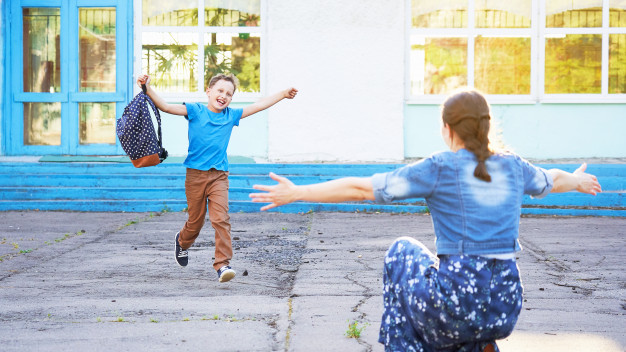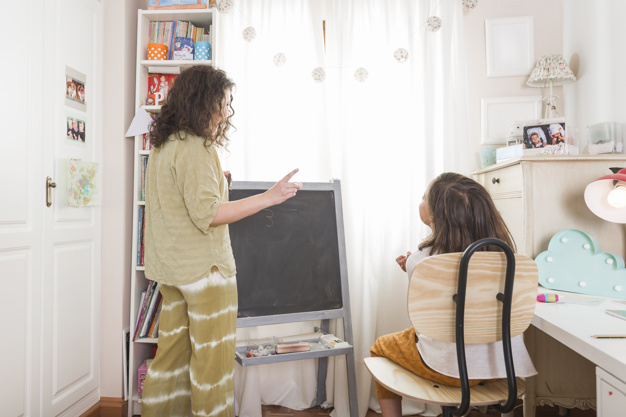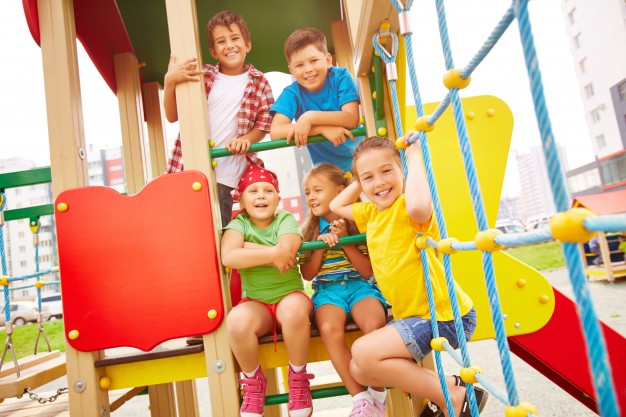


Emotions are running high in every child as well as for parents with the end of summer vacation. This means saying goodbye to the fun summer holiday and preparing your going kids back to school adjusting to a new regular schedule for the new school year. Here are some tips for parents!
“Every kid is one caring adult away from being a success story.” — Josh Shipp
Every parent who has to send their kids back to school often faces the challenging task of getting them ready. And it’s not just preparing all their belongings, it’s about preparing them at an emotional, physical and intellectual level.
If you’re ever at a loss of what to do when sending your kids back to school, we have compiled 25 smart tips for parents that will help you keep organized and make sure your kids get a running start for a new school year.

Whether you’re enrolling your child in school for the first time or sending your kids back to school, it always helps to prepare your child emotionally and socially. Most kids become nervous about new situations such as coming to a new school or classroom and meeting new people. It is but normal for your kids to experience a range of emotions about returning to school from long summer days.
It can be very helpful to rehearse entry into the new environment. Making friends, being respectful to teachers, and learning manners are vital skills that many adults would want to see in their children. And these tips below will help your child on their way to a healthier social life.
Share your insights about the importance of education. Discuss with your kids in a happy and enthusiastic way about the excitement of going back to school, having new school stuff, meeting new friends and teachers, and learning new things for the new school year.
Another way to familiarize your kids with the idea of school is through books. Spend some time reading it with your kids on a regular basis weeks before the school opening. That way, they will have a chance to ask questions and become comfortable with the school they will be attending.
Some factors that need to be addressed as tips for parents is to prepare their kids emotionally for the upcoming school year. Children often look up to their parents at a young age, either for guidance or just simply someone to talk to. Share your experience and all the fun you had in school back when you were still a kid.
Ask them what they expect about returning to school and listen to their anxieties. This will help kids deal with the things they worry about. Encourage them to ask questions if they’re not sure or just curious about anything. Also, allow them to share their thoughts and interests as it can help your child develop their social and communication skills in the long run.
Social interaction is extremely important and it should be taught at the early stage of a child’s life. Teach them how to listen. Remember, listening is different from hearing. And it’s a must that you teach your child the difference between the two.
Hearing means that you can hear what others are saying but are not necessarily paying attention (which is a no-no especially when it comes to teachers) while listening means fully understanding what others say. Teach them also to respond politely when they’re talked to, as it can also build respect and mutual understanding.
Sometimes words are not enough to express certain emotions that your child cannot explain. Helping them find a medium to express all those emotions can be a huge refresher such as expressing themselves through arts, music, writing, etc.
It can also help by reading them stories in order to start the conversation and to make it easier for them to talk about their reactions. Kids feel nervous especially when expressing their feelings in front of the class. As for tips for parents, let them know that other kids feel the same way too and that teacher is there to help them feel more comfortable.
Showing your love and affection to your kids is very important. It never hurts to give them a hug and say “I love you” as you send them off to school and give them a hug once they come back from school. This is a huge factor for teaching your child how to love others, particularly towards their classmates, peers, and teachers.

Getting ready for your kids back to school also requires rebooting their physical skills. Children spend more than 7 hours per day on average watching TV or using their computers, phones, and other electronic devices as their pastimes. The lazy days of summer can basically cause a lapse in your child’s physical activity when returning to school.
Unless your child has spent most part of the summer break doing sports or summer camp for kids, or even attending kids events, it is important to keep them motivated and moving a week or days before school starts. As tips for parents, discuss with your kids the importance of sleep, diet, exercise, and downtime to make sure they stay well. You can make the physical transition easier for kids by following the smart tips below.
After staying away from books and doing fun things to do with kids during the whole summer, it can be very challenging to jump back into the old routine. To keep them physically prepared even before school starts, re-establish a regular bedtime and set the alarm a little earlier every morning. This will help your child adjust to their sleeping hours and wake up time to get ready for school. You can gradually transition your daily school routine at least a week before the school year opening.
A balanced diet starts with a healthy and hearty breakfast. Kids meals and snacks today usually contain a lot of fat and sugar, which a lot of kids like but in the long run can develop into negative side effects like high cholesterol and weight gain. A healthy balanced diet to start the day may not sound all that tasty for your child but will help them give them a boost of energy. The same can apply to lunch and dinner as well.
Children love to play video games and watch TV. But there needs to be a balance of physical activity added in. As tips for parents, give them at least two hours of TV and video game time each day and devote the rest of their free time encouraging them to get into more physical activities like sports or playing outside. In addition, reduced TV/game time can help reduce eye strain.
There are always plenty of things to do with kids. And so the word “exercise” may sound like it may not be for children at a young age, but in reality, exercise does more than just build muscle and lose weight. Exercise can keep a kid’s joints and muscles healthy. This would become especially useful since they will spend hours sitting on a desk in a classroom.
As for tips for parents, encourage children’s fitness by just running, walking, biking, swimming, or playing at the park. You don’t need those fancy equipment to indulge your kids in any physical activity.
Pediatric doctors are more knowledgeable about children’s health. They can help you suggest what food to eat, sports, or physical activity that’s best for them, provide checkups and prescribe medicine in case they get sick while in school.

After two to three months of enjoying the summer vacation, most kids need a jumpstart to exercise their brains before school begins. As for tips for parents, you can help them warm up by starting reading, writing, or honing their basic skills. It also helps to brush up on the previous knowledge that can actually help them for the new school year.
Mentally preparing your children for school can help them overcome the many challenges that would come their way as they start attending classes day after day. Kids can come to school with many skills that teachers can build up. And excellent grades can result from a well-prepared child for school. If you want your kids to hit the ground running academically this school year, follow the tips below.
As for tips for parents, make a space in your home that is conducive to doing homework for your kids. It could be in their bedroom or a study room where it is quiet and without any distractions.
Helping your child with homework can work in two ways. First, teaming up with your child to accomplish their homework can strengthen your bond. And second, it can help them understand their homework better. It’s even more important if your child is attending a preschool. A little tutelage can go a long way!
Most kids love trips to the library where they can find books they like to read. The quiet atmosphere makes it the ideal venue to do research or to make an advanced study even before school starts. A visit to the library can also recharge your kid’s love of reading. You can give them a few interesting titles to start out the school year.
Not just video games and sports, but puzzle games or games that involve thinking, using logic, and even some thinking outside of the box to find solutions. Helping them develop their problem-solving skills can be a huge benefit when they apply them to their school work.
There’s always something new to learn in school and it’s very common that they will encounter new words on a daily basis. As for tips for parents, teach your child to not be afraid to come up to you for help if they’re having trouble understanding a word.
Reading bedtime stories is one thing, but reading about topics your child is studying in class (like history), will help them understand the subject even more on top of their classes. These would also be a perfect opportunity to answer questions that your child could not during class.

When you send your kids back to school, expect them to spend a long time away from you. Even so with completing certain tasks at school or making decisions without your input. For most kids, this scenario can be a bit daunting.
Teaching your kids the necessary skills and disciplines to explore their capabilities will help build their sense of independence. This is another important quality for a growing child to develop as they grow into teenagers and eventually into adulthood. Here are some effective tips to develop their willingness to do things on their own.
This may seem like a small task, but small things can lead to bigger ones. Encouraging your children to dress up on their own will teach them a better sense of responsibility and self-care. You won’t be always there for your kids, so it’s very important to teach them how to do things their way, and getting dressed is the first step.
As stated above #11, while it may be a good opportunity to help your child with homework if you feel they have difficulty finishing it, on the flip side it’s also a good opportunity to not offer them help especially if they never asked for it. This grows to let them solve problems on their own at school if the need arises and there’s no one else to assist.
As they say, “Sharing is caring.” Teach your kids how to share the important value of caring for others. It’s one thing to learn how to be independent. It’s another to be independent yet very considerate of others. For example, you can let them bring their own coloring materials to school, but encourage them to share the materials if anyone wants to borrow from them.
It really helps to train your kids to use the toilet on their own. It’s among the first steps of being independent for a young child. Explain to them that there are separate toilets for girls (cubicle) and boys (urinal) when they’re at school. Teach them the basics like opening and shutting toilet locks and flushing the toilet bowl or urinal after use.
Kids’ activities at school can be pretty wild and messy. But once all is said and done, it’s only up to the teacher who will clean up after them. Teaching kids to clean up their own messes at home like picking up their toys after use, or putting back the books on the bookshelf, is a great way to teach them to care for their surroundings.
Also, teach your kids to practice packing and unpacking their own backpacks they will be using before and after school.

While it is important that your kids focus on their studies, it is just as important that they are also involved in extra-curricular activities. After school programs are an excellent way to extend your child’s time at school. Activities can range from clubs to even classes that help students with their homework. The benefits of sending your child to any of these types of school activities can range from better school performance to meeting new friends. Here are some suggestions that might find very useful for your kids.
Every school always has its own list of sports activities, and a lot of them specialize in certain sports. Depending on what sport your child is interested in, enrolling them at a specific sports program can help develop their physical ability even to more competitive levels.
Whether it’s drawing, painting, writing, singing, playing instruments, art can bring out the more creative side in your child. Schools always have art programs that bring together like-minded artists from all over the campus.
After school science programs will help your child and their curious nature to even greater levels. Science programs feature demonstrations, activities, lectures, and other events that science-minded kids would find exciting, with a wide range of topics to cover like engineering, rocketry, chemistry, and more.
Sometimes, you would want your child to put in a little more extra time into their studies in order to improve their grades. Groups of students would form study groups to effectively share notes and learn from each other. This is especially effective when it’s formed between close friends.
Sometimes, art, science, or sports wouldn’t fit what you believe would be perfect after-school activity. But in some cases, students would form their own group or a club. Clubs revolve around a specific interest or a theme, which will bring in like-minded individuals. You can even encourage your child to form their own school club if they so desire.
There’s nothing more discouraging than sending your kids back to school unprepared. As parents, it is our sole responsibility to oversee the transition and make it smooth and easier for your kids. Keeping open communication between you and your kids is vital to your child’s academic success. As we welcome another school year, it is best that they are prepared emotionally, socially, physically, academically and promote independence even before classes for kids start.
Do you already have a shopping list for school supplies and other accessories for your kids? Check out our 20 Cool Kids Back-to-School Must-Haves That Will Last All Year Round.
Looking for more school resources for kids around the Sacramento area? Browse through our schools and activities page.
Just enter your email address below and you’ll get an email every time we publish a new post!
Categories :
Notifications